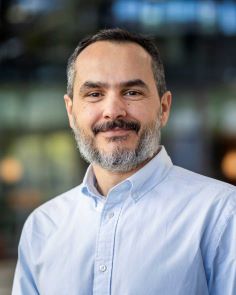Project: Conditional Generation of Materials for Carbon Capture
Description

n recent years, the urgency of addressing the climate crisis, resulting from escalating greenhouse gas emissions, has increased. A potential solution for the increasing amount of CO2 in the air is carbon capture. Zeolites are potential candidate materials for carbon capture, as they are cheap and easy to synthesize.
Zeolites are crystalline, porous materials, which consist of TO4 tetrahedra, where T can be either Aluminium or Silicon. Depending on its distribution of Aluminium and Silicon, a zeolite has different properties regarding its capacity to adsorb CO2. Traditionally, before atempting to synthesize a new zeolite, (physical) computer simulations are carried out to predict properties of the material, and select good candidates for synthesis. These simulations can take quite long (hours/days), resulting in the fact that the search space of all possible zeolite configurations cannot be covered well.
In previous work [1], we developed a model for predicting the CO2 adsoprtion capacity for a single type of zeolite (MOR). The zeolite is processed by a GNN, which makes use of parameter sharing based on the symmetries of the crystal to improve the expressivity of the model. In addition, we directly modeled the porous structure of the zeolite through the addition of pore nodes in the graph.
Due to the periodic and discrete nature of their crystal structure, creating a generative model for zeolites is not straightforward. Recently, multiple architectures for generating materials have been proposed, such as Crystal Diffusion VAE [2]. The goal of this project is to model zeolites using such a method, and making the model conditional on variables such as adsoprtion capacity. This would allow us to obtain a better representation of zeolites, as well as enable us to conditionally sample useful materials.
[1] Petković, M., Romero-Marimon, P., Menkovski, V., & Calero, S. (2023). Equivariant Networks for Porous Crystalline Materials. arXiv preprint arXiv:2304.01628.
[2] Xie, T., Fu, X., Ganea, O. E., Barzilay, R., & Jaakkola, T. S. (2021). Crystal Diffusion Variational Autoencoder for Periodic Material Generation. In International Conference on Learning Representations.
Details
- Supervisor
-
 Vlado Menkovski
Vlado Menkovski
- Secondary supervisor
-
MPMarko Petkovic
- Interested?
- Get in contact